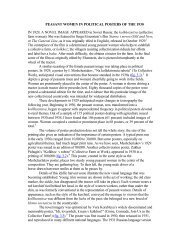Berkeley's Betrayal - Public Sociology @ Berkeley - University of ...
Berkeley's Betrayal - Public Sociology @ Berkeley - University of ...
Berkeley's Betrayal - Public Sociology @ Berkeley - University of ...
You also want an ePaper? Increase the reach of your titles
YUMPU automatically turns print PDFs into web optimized ePapers that Google loves.
Sam’s story is not unique. Behind the stately façade <strong>of</strong> America’s most prestigious publicuniversity, custodians, food service workers, groundskeepers, and clerical workers toil under conditionsthat betray the very principles which we want our university to embody. And yet, students,pr<strong>of</strong>essors, and administrators know surprisingly little about the sacrifices made andinjuries suffered by those who clean their classrooms and dormitories, cook their meals, maintainthe grounds, and record their grades.As sociology graduate students at the <strong>University</strong> <strong>of</strong> California at <strong>Berkeley</strong>, we usually focusour scholarly attention on “the world out there,” far beyond Sproul Plaza and Sather Gate. In ourcapacity as graduate student instructors, we encourage our students to explore the causes <strong>of</strong>poverty, the repercussions <strong>of</strong> inequality, and the <strong>of</strong>ten invisible power dynamics in our society.Rarely do we, as scholars and teachers in the making, explore the social ills that exist right herein our cherished halls <strong>of</strong> learning.This project began when we realized that all was not in fact well with the labor force at U.C.<strong>Berkeley</strong>. Like most members <strong>of</strong> our society, we came to the university taking for granted thateven as serious problems pervade the society around us, the university community is a protectedspace where the dictates <strong>of</strong> money-making give way to the mission <strong>of</strong> creating an inclusive educationalcommunity. It is easy to believe U.C. Chancellor Robert Berdahl when he says thatbeing a university employee means “you work in a stimulating and vibrant environment rich indiverse ideas, talents, and public service.” <strong>University</strong> policies, Berdahl explains, promote “anenvironment <strong>of</strong> trust, openness, responsibility and tolerance, so that a sense <strong>of</strong> community canprevail.” 1 Indeed, most workers are proud to work at such a prestigious university and are deeplycommitted to performing the everyday tasks necessary for its ongoing functioning. They appreciateworking on <strong>Berkeley</strong>’s beautiful campus and enjoy interacting with students. Donald, a longtimecustodian, likes being around the students. “To me,” he says, “everyone’s like family.”Samantha, a student affairs <strong>of</strong>ficer, agrees. “The students are the best part <strong>of</strong> my job.”Many workers, like most students and pr<strong>of</strong>essors, also came to U.C. <strong>Berkeley</strong> with highexpectations about contributing to a world-class educational institution. What we discovered,however, is that their expectations were quickly crushed once they got on the job. Not wanting tocomplain, they tell cautiously at first, but passionately once they get going about finding themselveson the brink <strong>of</strong> poverty and routinely facing dangerous and degrading employment practices.But their disappointment extends beyond their own personal injuries; many workers feelbetrayed and disillusioned by the university’s narrow focus on the financial bottom line, underminingthe ideals that the university has long held dear—fairness, objectivity, safety, dignity andrespect. Kim, a student affairs <strong>of</strong>ficer, has come to expect that the “university will pretty much doanything for money.” “At some point,” she assures us, “Sather Gate will be called McDonald’sArches. The question is, for how much?”Workers’ experiences at U.C. <strong>Berkeley</strong> can only be understood against the backdrop <strong>of</strong> thewidespread corporatization <strong>of</strong> American universities. This transformation <strong>of</strong> the universityreflects the rise over the last three decades <strong>of</strong> a free market fundamentalism which posits thatunregulated capitalism is the best system, both morally and practically, for organizing all spheres<strong>of</strong> society. 2 We expect universities to be qualitatively different from for-pr<strong>of</strong>it corporations, witha distinct set <strong>of</strong> ethical aims, including the pursuit <strong>of</strong> knowledge, the investigation <strong>of</strong> moral andsocial problems, the molding <strong>of</strong> young adults into good democratic citizens, and the cultivation<strong>of</strong> community. However, the organizational and ideological blurring <strong>of</strong> universities with for-pr<strong>of</strong>itcorporations has been occurring at an alarming and ever-increasing pace.4



